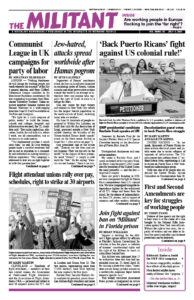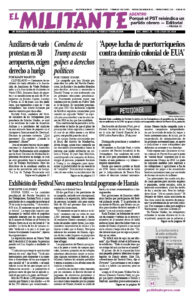Support is building for the Militant’s fight against efforts by officials at Florida’s Jackson Correctional Institution to ban the paper, a violation of inmates’ constitutional rights and the right of the Militant to reach its subscribers behind bars.
The Militant was informed May 17 by authorities there that they had impounded issue no. 17, dated April 29, for running a photo they claim, “shows dead person being paraded around on a motorcycle; magazine depict hatred toward a specific race.”
This widely circulated Associated Press picture accompanied an article in the paper opposing Jew-hatred. It shows the body of a Jewish man murdered by Hamas during its deadly Oct. 7 pogrom in Israel being driven around Gaza City to cheers by the Islamist group’s supporters.
Prison authorities claim the photo is “dangerously inflammatory” and violates prison rules, including the encouragement of “riot, insurrection, rebellion” and “organized prison protest.”
David Goldstein, the Militant’s attorney, filed an appeal May 23 urging the Florida Department of Corrections Literature Review Committee to overturn the ban.
“Jackson’s impoundment of the issue constitutes unconstitutional censorship,” he wrote. “It is discriminatory and arbitrary, in violation of the Militant’s rights to Due Process and Equal Protection under the Constitution’s 14th Amendment.”
Copies of protest letters by readers and civil liberties organizations calling for the ban to be overturned have been arriving at the Militant.
“Publications like the Militant have a First Amendment right to communicate with their incarcerated subscribers,” wrote the Reporters Committee for Freedom of the Press. “Incarcerated individuals also have a First Amendment right to receive publications like the Militant through the mail.”
“The Reporters Committee urges the Literature Review Committee to overturn the impoundment,” they said. “Far from encouraging violence, the headline, subheadlines, and text of the article, decry violence and convey a clear message against ‘hatred toward’ any specific group.”
“The Militant is a newspaper reporting on events and facts and as such does not represent a threat to the security of any carceral facility,” wrote Moira Marquis, on behalf of PEN America. “We hope the Florida Literature Review Committee will not only see the unwarrantedness of this censorship but keep in mind the need to maintain free expression as a basic human right.”
Fifteen members of UNITE HERE Local 23 who work at a Dallas-Fort Worth airport caterer sent a petition demanding the lifting of the ban. “The undersigned are joining the fight to defend the right of prisoners to read material of their own choosing and the right of newspapers to have subscribers behind bars,” they wrote.
The Militant has “taken a principled, ethical stand against government overreach by political police forces. They stand by constitutional guarantees,” wrote a prisoner from Illinois. “I urge you to permit the inmates of FDOC to open their minds by perusing the pages of the Militant.”
Since 2013 Florida prison officials have tried to suppress issues of the Militant nearly 50 times. The paper challenges every ban and has won the vast majority.
Letters can be sent to Saritza.Legault@fdc.myflorida.com or to Florida Department of Corrections, Literature Review Committee, 501 South Calhoun St., Tallahassee, FL 32399-2500, with copies to themilitant@mac.com.

